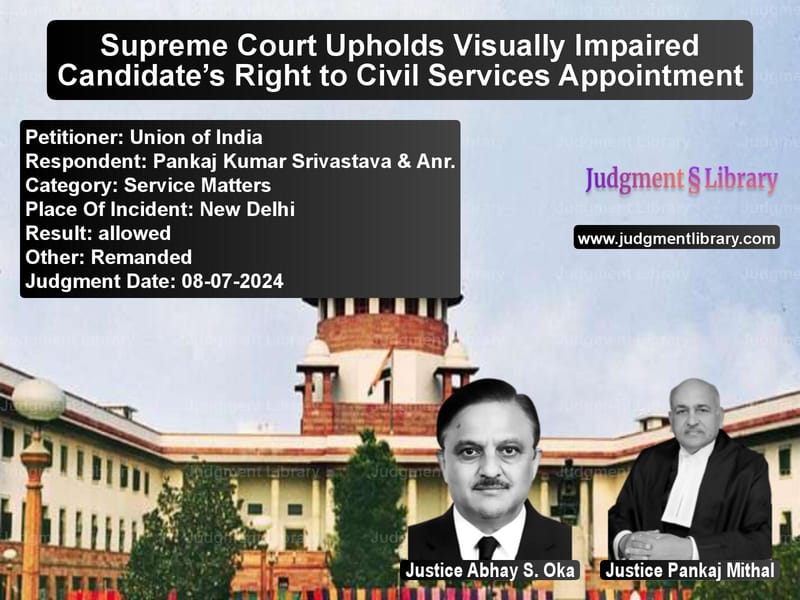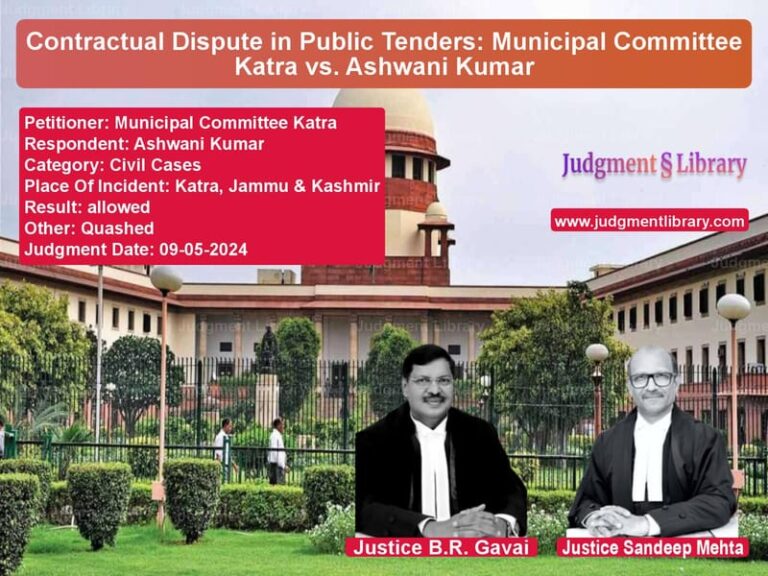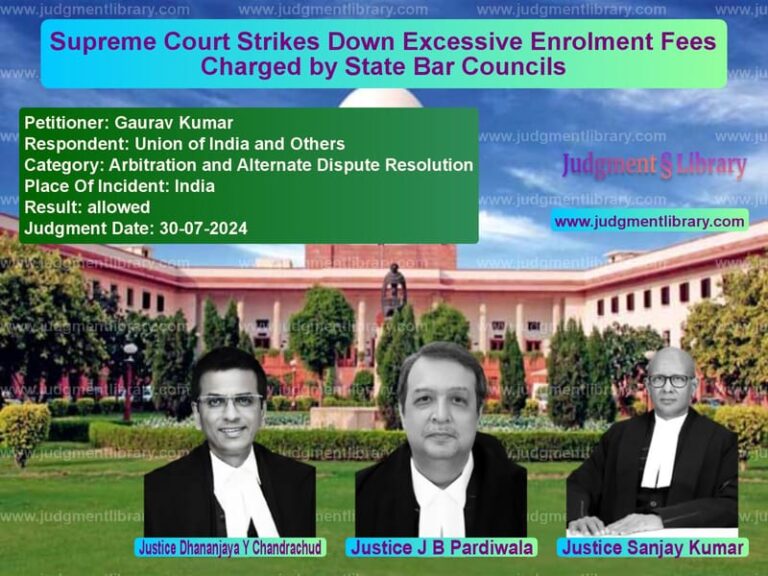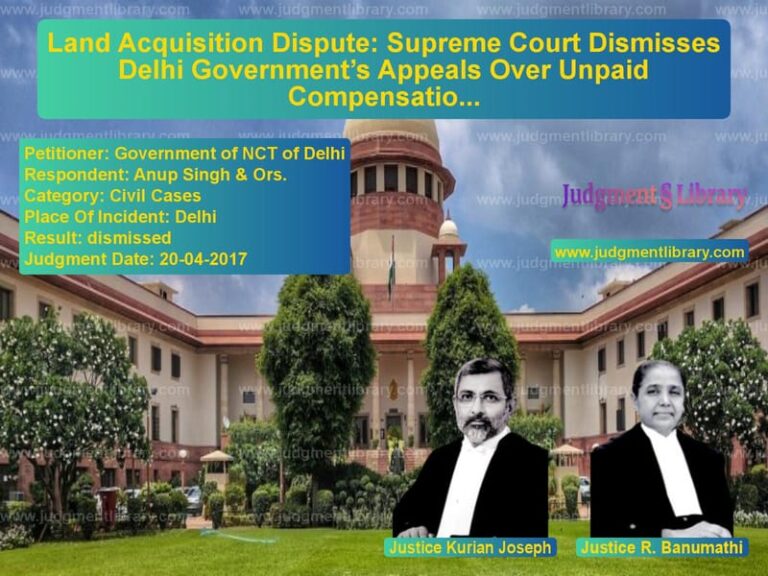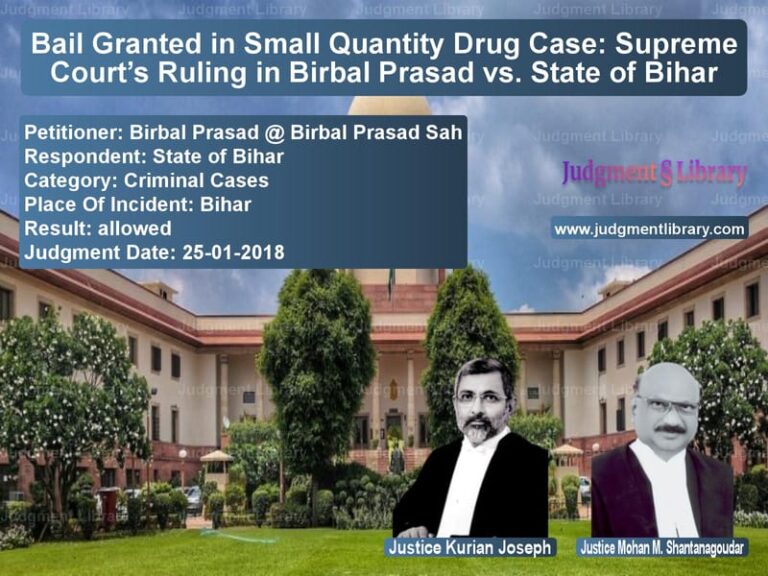Supreme Court Upholds Visually Impaired Candidate’s Right to Civil Services Appointment
The Supreme Court of India has ruled in favor of a visually impaired candidate in Union of India vs. Pankaj Kumar Srivastava & Anr., addressing the backlog vacancies for persons with disabilities in civil services. The ruling highlights the failure of the Union of India to implement the Persons with Disabilities (Equal Opportunities, Protection of Rights and Full Participation) Act, 1995 (PWD Act) and sets a precedent for ensuring fair appointment processes.
Background of the Case
The case concerns Pankaj Kumar Srivastava, a 100% visually impaired candidate who appeared for the Civil Services Examination (CSE) in 2008. Despite securing a qualifying score and being eligible for the Persons with Disabilities (PWD) category, he was denied an appointment.
Srivastava filed an Original Application before the Central Administrative Tribunal (CAT), arguing that backlog vacancies under the PWD Act had not been filled. The CAT directed the Union Public Service Commission (UPSC) and the Department of Personnel and Training (DoPT) to calculate the backlog vacancies and allocate a service to him. However, despite this direction, UPSC refused to consider him, leading to prolonged litigation.
Key Legal Issues Before the Supreme Court
- Whether the Union of India failed to implement the PWD Act, 1995, in Civil Services recruitment.
- Whether backlog vacancies for visually impaired candidates should be counted from 1996 to 2009.
- Whether the Union of India was required to allow interchange of unfilled PWD vacancies across different disability categories under Section 36 of the PWD Act.
Petitioner’s Arguments
The Union of India contended:
- The respondent did not secure a high enough rank in the PWD category to be selected.
- There were no remaining vacancies in the Visually Impaired (VI) category in CSE-2008.
- Reservations were provided in Locomotor Disability and Hearing Impairment categories but not for visually impaired candidates in IRS (IT) and IRS (C&E) services.
- The backlog vacancies had already been filled in accordance with UPSC guidelines.
Respondent’s Arguments
Pankaj Kumar Srivastava countered with the following arguments:
- The Union of India did not implement the PWD Act from 1996 to 2009, leading to a backlog of vacancies.
- As per government records, at least 42 vacancies were available for visually impaired candidates in CSE-2008.
- The UPSC and DoPT failed to provide reservations in IRS (IT) and IRS (C&E) without issuing a proper exemption notification under Section 33 of the PWD Act.
- Section 36 of the PWD Act allows interchange of unfilled vacancies among different disability categories, which should have been considered.
Supreme Court’s Observations
The Supreme Court analyzed the case in detail and made the following key observations:
1. Failure to Implement the PWD Act
The Court found that the Union of India had failed to implement the PWD Act from 1996 to 2009. The backlog of vacancies in various civil services was due to this non-compliance.
2. Backlog Vacancies Calculation
The Court referred to an affidavit filed by the Union of India, which admitted that 41 backlog vacancies for PWD candidates existed between 1996 and 2009. Of these:
- 20 were for Locomotor Disability or Cerebral Palsy (LDCP).
- 5 were for Visually Impaired (VI).
- 16 were for Hearing Impairment (HI).
The Court ruled that these vacancies should have been filled by eligible candidates, including Srivastava.
3. Incorrect Exemption for IRS (IT) and IRS (C&E)
The Court found that the Union of India failed to produce any official notification exempting IRS (IT) and IRS (C&E) from reservations for visually impaired candidates. In the absence of such a notification, the reservation had to be applied.
4. Applicability of Section 36 of the PWD Act
The Court emphasized that Section 36 allows for interchange of unfilled vacancies among PWD categories. Since 19 backlog vacancies remained unfilled, these should have been utilized to accommodate Srivastava and similarly placed candidates.
Final Judgment
The Supreme Court ruled:
- The Union of India must redo the exercise of ascertaining backlog vacancies for visually impaired candidates.
- Srivastava and 10 other visually impaired candidates above him in merit must be considered for appointment.
- The interchangeability of vacancies under Section 36 should be applied to ensure fair allocation.
- The Union of India must complete this exercise within three months and grant appointments prospectively.
Implications of the Judgment
This ruling establishes a crucial precedent for the implementation of disability reservations in civil services. It ensures that backlog vacancies are accounted for and filled in a fair manner. The judgment also clarifies that executive actions cannot override statutory mandates and reaffirms the right of visually impaired candidates to equal opportunities in government employment.
Petitioner Name: Union of India.Respondent Name: Pankaj Kumar Srivastava & Anr..Judgment By: Justice Abhay S. Oka, Justice Pankaj Mithal.Place Of Incident: New Delhi.Judgment Date: 08-07-2024.
Don’t miss out on the full details! Download the complete judgment in PDF format below and gain valuable insights instantly!
Download Judgment: union-of-india-vs-pankaj-kumar-srivast-supreme-court-of-india-judgment-dated-08-07-2024.pdf
Directly Download Judgment: Directly download this Judgment
See all petitions in Recruitment Policies
See all petitions in Public Sector Employees
See all petitions in Employment Disputes
See all petitions in Promotion Cases
See all petitions in Pension and Gratuity
See all petitions in Judgment by Abhay S. Oka
See all petitions in Judgment by Pankaj Mithal
See all petitions in allowed
See all petitions in Remanded
See all petitions in supreme court of India judgments July 2024
See all petitions in 2024 judgments
See all posts in Service Matters Category
See all allowed petitions in Service Matters Category
See all Dismissed petitions in Service Matters Category
See all partially allowed petitions in Service Matters Category

